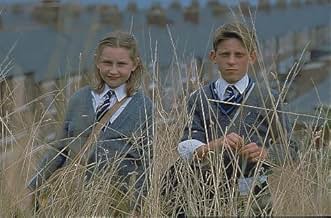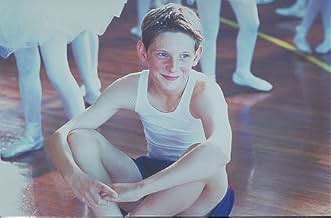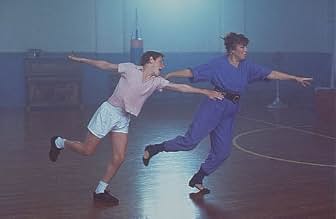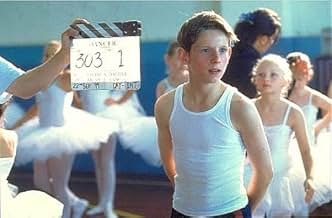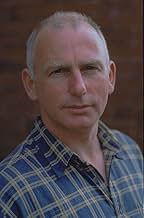Um jovem bailarino se ve dividido entre seu amor pela dança e a desintegração sa sua familia.Um jovem bailarino se ve dividido entre seu amor pela dança e a desintegração sa sua familia.Um jovem bailarino se ve dividido entre seu amor pela dança e a desintegração sa sua familia.
- Direção
- Roteirista
- Artistas
- Indicado a 3 Oscars
- 55 vitórias e 71 indicações no total
Colin MacLachlan
- Mr. Wilkinson
- (as Colin Maclachlan)
Matthew James Thomas
- Simon
- (as Matthew Thomas)
Avaliações em destaque
Billy Elliot is a truly inspirational movie. It reminds us of the human potential to transcend our economic surroundings and the expectations of society by doing something so simple, and yet sometimes so very difficult, as simply being ourselves.
Born in a socially and economically repressed mining town, Billy is told that boys box or wrestle; boys don't dance. But Billy loves to dance and does so every chance that he gets.
Does a love of ballet make you gay? Does it matter if your best friend is a crossdresser? How far will a father go when he realizes the truth about his son? This is a movie of change, growth and emotion, with characters and actors so real and fully developed that they pull your heart forth and place it firmly upon the screen. We literally feel the brittleness of judgement, the despair of lost hope, and the joy of acceptance.
It is easy to see why this small British film has won so many foreign awards and nominations, and I only hope it will be given the chance it deserves to inspire and transform US audiences as well.
Born in a socially and economically repressed mining town, Billy is told that boys box or wrestle; boys don't dance. But Billy loves to dance and does so every chance that he gets.
Does a love of ballet make you gay? Does it matter if your best friend is a crossdresser? How far will a father go when he realizes the truth about his son? This is a movie of change, growth and emotion, with characters and actors so real and fully developed that they pull your heart forth and place it firmly upon the screen. We literally feel the brittleness of judgement, the despair of lost hope, and the joy of acceptance.
It is easy to see why this small British film has won so many foreign awards and nominations, and I only hope it will be given the chance it deserves to inspire and transform US audiences as well.
I went into this movie expecting to hate it, and found myself instantly smiling at the playful opening credits with Billy jumping on a trampoline. From there on it just got better and better. The wasn't even a minor character that I could say needed work. The cast as a whole was brilliant - and surprising at times. The father and brother come off as these one-sided brutal characters in the beginning and then as you watch, they become two of the most well constructed and acted characters this year and for who knows how long. Jaime Bell is brilliant for a first-timer and his dance is wonderful. There are also so many layers to the film. From brilliant cinematography to wonderful symbolism both in the script and in the music (listen for the tune Billy is playing on piano in the main score during the big moments). The music on a whole was brilliantly picked and I don't think a single element was overlooked or addressed. If you haven't seen this movie - GET OFF YOUR BUTT AND INTO THE THEATER! It is truly an experience that everyone should have and I hope to see more from this writer, director and a brilliant new face in Jaime Bell.
This movie is such a good film for a number of reasons. As a study of daring to be different in the fact of intractable tradition, Billy Elliot is beautiful, touching, poignant and very honest. It does start off slowly, but the film does have a lot of heart. Firstly, I liked the story, a young boy who wishes to ballet dance against the the backdrop of the 1984 miner's strike, it was a nice one and is likely to evoke some emotion. Stage director Stephen Daldry makes his feature debut here, and succeeds pretty much brilliantly. Another strong asset was the writing, while funny in places, it is also quite touching. Then the music, I loved hearing the music Tchaikovsky's timeless ballet "Swan Lake", such a melancholy yet enchanting and haunting score. But really the best asset of the film is the acting. Jamie Bell gives a really believable performance in the lead role, while Gary Lewis is marvellous as his dad. The acting honours though go to the brilliant Julie Walters as Billy's chain smoking dance instructor, that role especially proves what a fine actress Walters is. In conclusion, I loved this film. 9.5/10 Bethany Cox
Billy Elliott is a moving, uplifting, and often exuberant, drama about motherless young Billy (Jamie Bell) fulfilling his dream of becoming a ballet dancer, in the process overcoming the objections and prejudices of his father and brother (Gary Lewis and Jamie Draven).
It is also a piece of magic realism, with political overtones. By setting their near fairy tale in the context of a close-knit mining community, and more specifically against the backdrop of the 1984/5 miners' strike - a defining moment of modern British economic and social history - writer Lee Hall and director Stephen Daldry are able to refer to gender and class issues, without turning their work into a political tract, and without losing focus on the central human drama.
The film is realised near flawlessly. Bell achieves a convincing blend of adolescent bewilderment and defiance; if his dancing is not quite as good as we might expect, the storyline explains this away by saying that at this early stage his attitude and drive are more important than his technique. The dancing set pieces, clearly inspired more by Fred Astaire and Gene Kelly than by Nijinksky, are performed with gusto, mainly to pop songs by T-Rex.
Lewis and Draven put gritty realism and passion into their roles of a father and son committed to their community and to the miners' cause. They make us feel their despair as they realise that this cause is lost; but also their endurance as they come to terms both with Billie's aspirations and their own uncertain futures - within a few years most UK coalmines would be closed. (The colliery in Easington, the real-life location of the film, closed in 1994.). The scenes of violence between strikers and police are presented uncompromisingly and authentically, but with the occasional touch of humour.
Julie Walters provides an outstanding performance as Mrs Wilkinson, the dancing teacher who recognises and fosters Billie's talent; and helps him resist his own and his family's inhibitions. She is perfect as the chain-smoking, straight-talking mentor, who has her own personal disappointments and hurts, which she hopes Billie's success will help heal. To we outsiders watching the movie, Mrs Wilkinson appears as an integral part of the local community; but it is made clear that in the mid-80s, as far as Billie's family and friends are concerned, she is a middle class outsider, almost as alien as another species.
One issue which the film tackles head-on is traditional heterosexual male abhorrence of homosexuality. This attitude clearly underlies the shock of Billie's father and brother when they discover his interest in ballet. They would be even more horrified if they realised that his best friend was discovering gay tendencies in himself. It is typical of the sensitive direction that without labouring the point the film indicates by its close that attitudes towards gays changed radically during the 1980s and 90s along with the industrial landscape.
It is also a piece of magic realism, with political overtones. By setting their near fairy tale in the context of a close-knit mining community, and more specifically against the backdrop of the 1984/5 miners' strike - a defining moment of modern British economic and social history - writer Lee Hall and director Stephen Daldry are able to refer to gender and class issues, without turning their work into a political tract, and without losing focus on the central human drama.
The film is realised near flawlessly. Bell achieves a convincing blend of adolescent bewilderment and defiance; if his dancing is not quite as good as we might expect, the storyline explains this away by saying that at this early stage his attitude and drive are more important than his technique. The dancing set pieces, clearly inspired more by Fred Astaire and Gene Kelly than by Nijinksky, are performed with gusto, mainly to pop songs by T-Rex.
Lewis and Draven put gritty realism and passion into their roles of a father and son committed to their community and to the miners' cause. They make us feel their despair as they realise that this cause is lost; but also their endurance as they come to terms both with Billie's aspirations and their own uncertain futures - within a few years most UK coalmines would be closed. (The colliery in Easington, the real-life location of the film, closed in 1994.). The scenes of violence between strikers and police are presented uncompromisingly and authentically, but with the occasional touch of humour.
Julie Walters provides an outstanding performance as Mrs Wilkinson, the dancing teacher who recognises and fosters Billie's talent; and helps him resist his own and his family's inhibitions. She is perfect as the chain-smoking, straight-talking mentor, who has her own personal disappointments and hurts, which she hopes Billie's success will help heal. To we outsiders watching the movie, Mrs Wilkinson appears as an integral part of the local community; but it is made clear that in the mid-80s, as far as Billie's family and friends are concerned, she is a middle class outsider, almost as alien as another species.
One issue which the film tackles head-on is traditional heterosexual male abhorrence of homosexuality. This attitude clearly underlies the shock of Billie's father and brother when they discover his interest in ballet. They would be even more horrified if they realised that his best friend was discovering gay tendencies in himself. It is typical of the sensitive direction that without labouring the point the film indicates by its close that attitudes towards gays changed radically during the 1980s and 90s along with the industrial landscape.
With a seemingly run-of-the-mill storyline - that of an 11-year-old schoolboy wanting to be a ballet dancer - it is quite a feat to have made a movie as warm and entertaining as this.
Quite simply, this is the best British movie in years. All the characters are intriguing, and the acting is flawless, most notably from 14-year-old Jamie Bell whose acting is utterly convincing, filled with humour and insight beyond his years. He is also a fantastic dancer, and some of the dance sequences are reminiscent of the dance-filled musicals of the old black and white movies.
The backdrop of the historic miners' strike of the mid-1980s, it brings the story down to the earth and adds the necessary tension to make this film truly believable and a worthy story to tell.
I find it hard to see how anyone would not like this film. 9 and a half out of 10.
Quite simply, this is the best British movie in years. All the characters are intriguing, and the acting is flawless, most notably from 14-year-old Jamie Bell whose acting is utterly convincing, filled with humour and insight beyond his years. He is also a fantastic dancer, and some of the dance sequences are reminiscent of the dance-filled musicals of the old black and white movies.
The backdrop of the historic miners' strike of the mid-1980s, it brings the story down to the earth and adds the necessary tension to make this film truly believable and a worthy story to tell.
I find it hard to see how anyone would not like this film. 9 and a half out of 10.
Você sabia?
- CuriosidadesJamie Bell was going through puberty at the time of filming. Some of his dialogue had to be post-synched as his voice had broken. And the opening scene in which he jumps up and down on a bed to T. Rex's "Cosmic Dancer" was shot over a lengthy period of time. For the latter takes, Bell had acquired hair on his legs and had to have them shaved.
- Erros de gravaçãoBilly's brother listens to music in his room (at around 42 mins) while wearing headphones but in cuts to the father and grandmother in other rooms in the house they hear the music as well. Some stereos allow the use of headphones and speakers together.
- Citações
Tutor 1: What does it feel like when you're dancing?
Billy: Don't know. Sorta feels good. Sorta stiff and that, but once I get going... then I like, forget everything. And... sorta disappear. Sorta disappear. Like I feel a change in my whole body. And I've got this fire in my body. I'm just there. Flyin' like a bird. Like electricity. Yeah, like electricity.
- Versões alternativasAn edited version was released in the USA rated PG-13 that tones down the language.
- Trilhas sonorasTop Hat, White Tie, and Tails
Performed by Fred Astaire
Courtesy of Turner Entertainment Co.
Composed by Irving Berlin
Irving Berlin Music Corp.
By kind permission of Warner/Chapplel Music Limited
Principais escolhas
Faça login para avaliar e ver a lista de recomendações personalizadas
- How long is Billy Elliot?Fornecido pela Alexa
Detalhes
- Data de lançamento
- Países de origem
- Centrais de atendimento oficiais
- Idioma
- Também conhecido como
- Dancer
- Locações de filme
- Easington, Peterlee, County Durham, Inglaterra, Reino Unido(Rialto Cinema)
- Empresas de produção
- Consulte mais créditos da empresa na IMDbPro
Bilheteria
- Orçamento
- US$ 5.000.000 (estimativa)
- Faturamento bruto nos EUA e Canadá
- US$ 21.995.263
- Fim de semana de estreia nos EUA e Canadá
- US$ 215.681
- 15 de out. de 2000
- Faturamento bruto mundial
- US$ 110.197.267
- Tempo de duração
- 1 h 50 min(110 min)
- Cor
- Mixagem de som
- Proporção
- 1.85 : 1
Contribua para esta página
Sugerir uma alteração ou adicionar conteúdo ausente

![Assistir a Trailer [OV]](https://m.media-amazon.com/images/M/MV5BZTAzNGQ0M2ItZGVhMi00OGY5LTgxMzgtZDBmYmMzZWM4OGQ0XkEyXkFqcGdeQXRyYW5zY29kZS13b3JrZmxvdw@@._V1_QL75_UX500_CR0)

